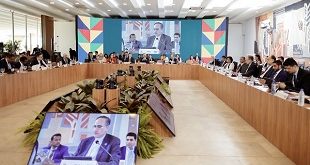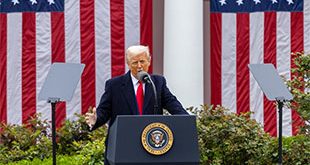
By Agather Atuhaire
President desperately fails to control a rebel parliament
Barely a year into his fourth five-year term, President Yoweri Museveni for the first time in his 26-year rule appears to be losing his grip.
Ten of his 15 top ministers have either resigned over alleged corruption or face censure by a rebellious parliament that refuses to be either bribed, intimidated, or seduced by Museveni.
President Museveni has met the MPs several times and exhorted them to toe the party line, he has allowed the Parliamentary Commission to give each of them a Shs 103 million car allowance cheque, and given them an unprecedented peek into his treasured Production Sharing Agreements (PSAs) with oil companies. Nothing has worked. The MPs remain adamant. They want Museveni to sack several other corrupt ministers or they will censure them.

Although President Museveni has so far put a brave face on the intra-party rebellion, observers tell The Independent that he is running out of options.
Maj. Gen. Mugisha Muntu, who was once Museveni’s army commander and blue-eyed boy, says Museveni has attempted many maneuvers but must have realised by now that he is up against “a great and decisive force (parliament)”.
Muntu, who although a mobiliser of the second largest party in parliament, the opposition Forum for Democratic Change (FDC), remains quite objective at times. He says Museveni has focused on regime survival and knows he is getting weaker and weaker. “All these things are happening because of a general state of weakness of the regime,” Muntu told The Independent.
He says Museveni must gather the courage to go through a self-reflection to tackle the issues the MPs and other Ugandans are raising or he will “face the power of the people”.
But other observers like researcher and political analyst Fredrick Golooba Mutebi say parliament is in fact dancing to Museveni’s tune.
“The president respects parliament when it suits him and defies it when it suits him,” said Golooba.
He says the resignation or censure of ministers, in fact, gives Museveni more leverage over parliament.
The MPs know that he has over 10 ministerial posts to fill, Golooba said, and are likely to be careful when criticising him.
“Others will be eager to please him for these positions,” Golooba says.
Unimpressed
Gerald Karuhanga (MP Youth Western), who is the lead Counsel of the Public Accounts Committee (PAC) which is at the forefront of harassing Museveni and his cabinet, also has his eyes on the vacant ministerial positions – but for a different reason.
He says Museveni should be alarmed because parliament has in a short time exposed the rot in his government. “It’s high time he cleaned up,” he told The Independent. “I am proposing that he advertises all the ministerial posts, so that he gets efficient ministers”.
He says what has gone before; the resignation of three ministers, the “stepping aside” of another three, and the flight of Prime Minister Amama Mbabazi to seek protection in the courts, is just the beginning of the fight against corruption.
“We have our list and we shall deal with all of them,” he says.
The chairman of PAC, Kassiano Wadri, is also baying for more blood because “there are many others who have robbed Ugandans of a decent living”.
“We shall handle them one by one, they are still many and we know all of them,” Wadri told The Independent.
Observers say the rebellion against Museveni is not only in parliament but also in cabinet. For a long time, Museveni has used his ministers as scapegoats for his personal mistakes and it appears some of them are unwilling to carry that responsibility any more.
When former ministers Syda Bbumba and Khiddu Makubuya resigned on Feb. 16 over alleged corruption in the fraudulent award of Shs 169 billion to Hassan Basajjabalaba, none of them accepted responsibility or showed any form of contrition.
Bbumba, in a chest-thumping statement to parliament, said she had walked “along the path of the rule of law and constitutionalism” over the deal. She said she acted on a binding decision of the attorney general.
Makubuya, who was attorney general then, also in a speech to parliament, maintained he had been misunderstood. Both were vague but they were understood to imply that the person to be held culpable in the scandal is President Yoweri Museveni.
The question since then has been why almost every public official feels it is alright to disobey and criticize Museveni.
The Bbumba, Makubuya saga is made even more dramatic by the confusing statements emanating from Museveni’s State House.
On the day the two ministers resigned, the 3rd deputy Prime Minister and Deputy Leader of Government Business Gen. Moses Ali, read what he said was a “presidential statement”.
Gen. Ali said the two ministers had taken political responsibility for the flaws cited in the report by PAC and their resignation had been approved by cabinet.
But, a day later on Feb. 17, the government’s official information bureau, the Uganda Media Centre, issued a statement signed by Prime Minister Amama Mbabazi announcing that “the President has decided to relieve the two ministers of their ministerial responsibilities with immediate effect.”
Mbabazi is a legal eel and there could in fact be no contradiction if his statement meant that President Museveni, as the appointing authority, had accepted the resignation. However, the popular interpretation is that Mbabazi implied the ministers had been sacked and not resigned.
Museveni’s tricks
Whether sacked or resigned, observers say the departure of the ministers is a continuation of compromises that Museveni has been forced to make as a result of mounting pressure from a parliament that once danced to his whims and caprices.
Just six days before they resigned, when Museveni had hurriedly appeared before parliament to explain himself before the MPs over new oil deals, many had expected him to explain his involvement in the Basajjabalaba compensation saga. He did not.
Instead he plunged into a convoluted and unrepentant explanation of why he hurriedly signed fresh PSAs with the oil company Tullow.
He said he did not want the MPs to “land the country into another strategic mistake” by frustrating oil production.
In an address boycotted by the opposition, Museveni lambasted the MPs and bragged about outwitting the MPs and going ahead to sign fresh oil deals after learning of their plot to secure a court injunction against the deal.
Interestingly, Museveni had earlier on Jan.12 summoned all MPs from his NRM party to their school of indoctrination, the National Leadership Institute at Kyankwazi for a 10-day retreat. The agenda was one: Museveni’s attempt to tame growing rebellion within the party or as NRM Caucus Leader, MP David Bahati, put it: “to strengthen unity, discipline and a code of conduct”. It did not work. Some NRM MPs boycotted the retreat publicly announcing that it was “a waste of time”. Even those who attended, however, returned to parliament vowing to censure Bbumba and Makubuya.
The point was not lost on many that Museveni had earlier, on December 21, 2011, met PAC and vowed to punish Makubuya and Bbumba over the Basajjabalaba deal. It is widely believed that Basajjabalaba did not carry away all the Shs 160 billion given to him. It is possible he “confessed” to Museveni that Bbumba, Makubuya, and Bank of Uganda Governor, Tumusiime Mutebile, pocketed some of it.
First, Museveni told PAC that Bbumba and Makubuya fraudulently paid Basajjabalaba is Shs169 billion and the Basajjabalaba should refund monies deemed in excess of what he was entitled to as compensation for lost business when his tenders over city markets were revoked.
Then, after the Kyankwazi retreat, on Feb. 3, Museveni wrote to the PAC boss saying he had new information that the payment to Basajjabalaba was “fair”. A day later, this too was denied by a presidential spokesman.
This might appear confusing but The Independent has information that Museveni has, in fact, been looking for a way to off-load Syda Bbumba. After the February 2011 elections, when a group from Nakaseke, Bbumba’s district, complained to Museveni about Bbumba, they left with the impression that Museveni would sack her.
Bbumba had been a spoiler in Nakaseke when she flexed her money and influence to fix the NRM area district chairperson election in favour of her protégé, Nsamba Bukenya, against incumbent Ignatius Kkoomu and ‘bought’ off contenders for her Nakaseke North seat.
Museveni and many of his bush war fighters have fond memories of Nakaseke and did not want Bbumba to “jeopardise” NRM’s support in the area. Museveni’s brother Gen. Salim Saleh has a ‘community’ farm at Kapeeka in Nakaseke, and it is one of the districts that perennially turn out the highest vote tallies for Museveni. Bbumba and six of her brothers took part in the bush war and Museveni was finding it difficult to fire her.
After the election Museveni picked Bbumba again, but as he would later tell PAC during its investigation of the Basajjabalaba issue, in “a lesser position”.
A close reading of Museveni’s cabinet appointments last May suggests he could have had an eye on transition from a crop of ministers in the greater Luwero district while carefully maintaining the region’s presence in cabinet.
Makubuya and Bbumba got less influential positions, from Attorney General and Finance to general duties and gender respectively. They would probably be dropped in the next reshuffle or may be censured.
But three new Luwero faces came in. Abraham Byandala (Works), John Chrysostom Muyingo (State for Education) and Rose Namayanja (state for Luwero Triangle), all came in, as if in preparation for taking over from the duo that would soon be dropped.
Mbabazi’s fate
Blowing hot and cold over an issue is an old Museveni trick that has in the past enabled him to win both tails and heads.
That is why most eyes are now on Amama Mbabazi.
Before he called the MPs to Kyankwanzi, Museveni appeared to make an interesting concession. He announced that he had ordered Mbabazi to withdraw the petition that he exploited to halt the activities of the ad hoc committee investigating him.
Museveni has shielded Mbabazi from a censure in the past. Therefore, eyebrows were raised when he appeared to release him to MPs who want to tear him apart.
Mbabazi, a legal workhouse, and suave but pompous strategist, is Museveni’s right hand man. It is unclear how Museveni plans to remain in charge if he lets him go to appease the MPs.
Museveni needs Mbabazi now especially because he is still on the spot over the Basajjabalaba compensation saga. Some MPs have faulted PAC for not listing his name among those implicated in their report.
Most opposition MPs say it feels like they are punishing the wrong people by pushing Bbumba and Makubuya to resign because there are clear directives they were following.
But PAC boss Wadri says although the president played a central role in the compensation, he neither compelled the AG nor the finance minister to folk out such amounts of money.
“Paragraph 151 of the report says the president played a central role because all the petitions were sent to him and he kept referring them to the AG,” Wadri said. “So it is not true that we did not mention him in the report.”
He says if there was more to the letters that would implicate the president more, the onus was on the ministers to mention it to the committee.
But PAC lead counsel Karuhanga says leaving out Museveni was tactical because otherwise all implicated individuals would blame everything on the President.
“It is not that we do not appreciate the fact that the president was also involved,” Karuhanga said. “We wanted to first get the MPs’ reaction on these other individuals. Otherwise if we had incriminated him we wouldn’t have achieved this (the resignation of the ministers).”
 The Independent Uganda: You get the Truth we Pay the Price
The Independent Uganda: You get the Truth we Pay the Price



